KLAUS SCHULZE TRIBUTE
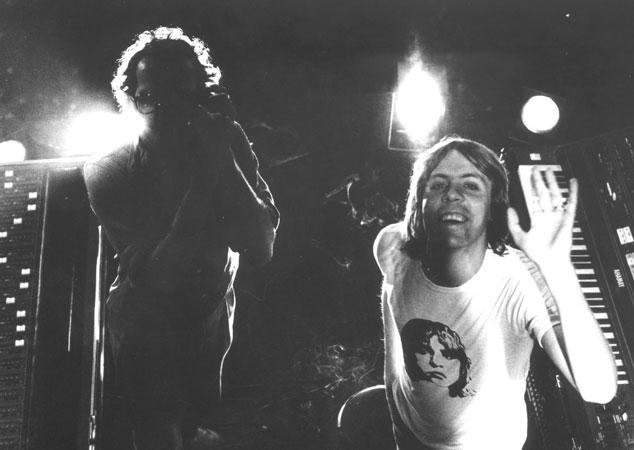
KDM and KS in the studio, 1979, courtesy of KDM
Interviews by Jason Gross
(October 2022)
Back in 1999, when manager/impresario Thomas Zielger and I were collecting tracks for our OHM: The Early Gurus of Electronic Music box set, one name in particular stood out for both of us, which had to be included. Klaus Schulze first became known as a member of Tangerine Dream (appearing on their 1970 debut) and a founding member of Ash Ra Tempel shortly afterwards. Though those two associations alone would make him legendary, he stuck out on his own, releasing albums from 1972 onward. By the time we did the box, he had dozens of albums out under his own name, not to mention numerous collaborations (including several notable ones with Pete Namlook), albums done as "Richard Wahnfried,; his "Dark Side of the Moog" series. Still to come were even more solo albums and his extensive La Vie Electronique box sets. A tireless artist for sure and not one to rest on any laurels, he provided listeners not just volume but also stunning varied, showing us who far and how varied the whole field of electronic music could be.
When we died this past April at age 74, we lost an unique artist for sure. To honor him, we spoke with his long-time manager Klaus D. Mueller, Eurock's Archie Patterson who has been a long time booster and expert on KS's music, film maker James L. Frachon (who collaborated with KS on several movies).
If that's not enough, why not hear from the KS himself? In 1997, I did AN INTERVIEW with him (I thought KS hated the whole thing but KDM insisted that he was amused).
Also see Darren Bergstein's 2006 article about SCHULZE IN THE '70'S.
PSF: Before you met KS, how did you get involved in the music scene?
KDM: Throughout the sixties, my musical interest was jazz, from King Oliver to Eric Dolphy and all between. I collected all their (historic or present) recordings and became an expert in this music. The same goes for Blues, from Bessie Smith the Robert Johnson to Muddy Waters and John Lee Hooker ...and all in between.
In 1970, I got my first job in the music business as tour manager for (mostly) jazz groups, The first was a German concert tour by the Paul Bley Synthesizer Show feat. Annette Peacock. Bley was a known jazz piano player, and during his concert, he also used a few heavy black boxes from a company called "Moog." His pure piano playing I (and the audiences) liked more.
Other concert tours all over western Europe (or single concerts in Berlin) I worked on were the Duke Ellington Orchestra, Lionel Hampton Orchestra, Klaus Doldinger, etc.. Even with the comedian Marty Feldman; but also a tour with three British Rock groups, one of the was Van der Graaf Generator. Must have been 1972. During that tour, I met in a Frankfurt music club a longhaired guy from my hometown Berlin who invited me to visit him and his friends in Berlin when the tour had ended. I did so. The young longhaired was Hartmut Enke, the bass player of Ash Ra Tempel, and his friends were Manuel and Rosie. From that moment on, I was part of this circle, mostly in Rosi's apartment. We were listening to records, (Fleetwood Mac, Peter Green) and smoking. A different drummer Ash Ra Tempel was hired for each gig.
My interest in Music had already changed in the very late sixties, mostly because of my heavy love for blues: I discovered that there is a TODAY music with names like Jimi Hendrix, Janis Joplin, Paul Butterfield, Stones...
PSF: When you first hear KS's music?
KDM: I don't remember that I have ever heard Klaus' music before I met him. My musical taste was mostly (American) jazz and blues then, and in the late sixties, early seventies I also visited concerts of some "modern" music which was performed at the Berlin "Akademie der Künste", often promoted by Walter Bachauer, who also had regular radio shows on a popular Berlin radio. He was the only one on radio who played Steve Reich, Terry Riley, Tibetan monk's music, Balinese music, sometimes mixed with the most modern pop music at this time, by Pink Floyd ...and sometimes some new music from Berlin (T.D. or Ash Ra Tempel).
Besides, how could I listen to KS' music- there were no concerts by him, and no albums? And when his first album came out, I worked already for Ash Ra Tempel (etc.). But, as everybody else, I was listening to American and some British modern rock music, but not Germans. Nobody bought German rock albums. This was just not "cool." Not even during all the evenings and nights we met, talked and smoked at Rosi's apartment, we were not listening to any German bands, but we put on the albums of Santana, Fleetwood Mac, Peter Green, some black soul music... Also I was NOT a visitor of Berlin "underground" places where Berlin rock bands were sometimes playing. Mind: UNKNOWN rock bands, at this time.
I even don't remember the (or any) "first time" when I have heard Klaus Schulze's music. Maybe it was in Paris, at this concert in February 1973, with Ash Ra Tempel, Tangerine Dream and KS. But I have no lasting impressions of the music which was played at this evening in Paris. I did my job, we all did our jobs and we had some fun (and stress) before and after. I do remember that Rosie had stage fright and therefore I had to make the short announcement for Ash Ra Tempel on stage. Remember: for us, such moments at this time are not part of "musical history," but daily doing.
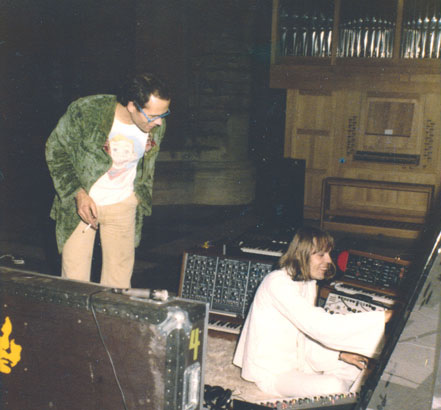
KDM and KS in Brussels, 1977, courtesy of KDM
PSF: How did you come to meet KS and when was this?
KDM: In Berlin, I started to help not only Ash Ra Tempel, but also some other groups: Os Mundi, Agitation Free, Tangerine Dream.
The very first "Klaus Schulze" contact was because Ash Ra Tempel needed a good tape recorder for the rehearsal (for a coming recording session in Switzerland, with Timothy Leary), and Hartmut remembered their old friend and former drummer Klaus Schulze owned such a recording machine. Hartmut and I went to Schulze's home but KS was not present, His lovely wife Rita gave us the machine (this was in early summer '72).
The first time I saw KS face to face was when we (A.R.T.) visited the OHR Record company (branch of the huge MEISEL publishers) in Berlin (in the summer of '72) to ask for some cash for our trip to Switzerland to record the planned Tim Leary album. After all, the project idea was Rolf-Ulrich Kaiser's (chef of OHR) and the label should finance at least our transport. By accident, also Klaus Schulze was present in these company rooms. He had just finished his first solo album and presented his idea for a cover of his first solo album Irrlicht. A few words were certainly exchanged, but I don't remember any impression that KS left with me (or vice versa).
A longer meeting with KS was a year later, in February 1973. Ash Ra Tempel (and Tangerine Dream) were invited to Paris for concerts. And I was present as roadie for A.R.T. and KS.
Meanwhile I had helped T.D. as well as KS (and Os Mundi, and Agitation Free) as a "roadie" (man for everything, with a tool box and the will to help, to work and to learn, and earn some little - very little - pocket money). Also for other gigs by other Berlin rock groups my help was needed. Sometimes I even got a job at the local concert club to help a visiting musician. Here I remember Stephane Grappelli for one evening concert in Berlin's "Quartier Latin" club. Or a Dixieland band from Prague that was a bit famous then; they played each day on a Berlin industrial fair and I was hired to help.
Directly after the Paris concert with Ash Ra Tempel, Klaus Schulze and Tangerine Dream, we all visited the Dieter Dierks studio (near Cologne) where chaotic sessions were held ("Cosmic Jokers"). Recently, someone had sent me a pic from one of the sessions, it shows me cowering beside Chris Franke playing a pair of congas.
And in August the same year (1973), KS was asked by Edgar Froese to join again TD for a short French concert tour. Meanwhile I was working a bit more (and especially) for KS, because he moved from his present girlfriend's apartment (he was already divorced from Rita) to a little empty shop to build his own studio...and I helped him heavily.
And I also went with Tangerine Dream (incl. Froese, Franke, KS) on this French tour. And we had one additional open air concert two weeks later near the town of Dusseldorf.
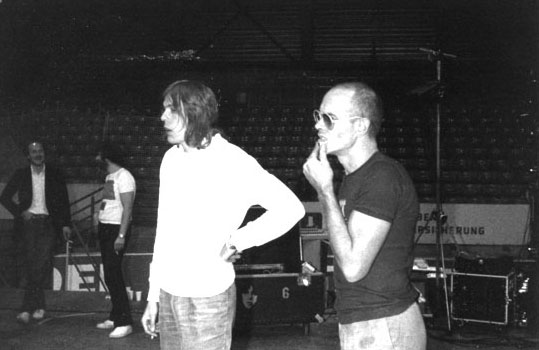
KS and KDM, backstage in Berlin 1978, courtesy of KDM
PSF: How did you come to manage him?
KDM: From then on, I worked mainly for KS. In this new studio. One little room was the (our) office and I started to bring some order into his life. I collected and filed contracts, letters, bills, answered letters and phone calls. The typical work of a "managing" career.
But of course I (at age 28) was a layman in business things, the same as Klaus Schulze (age 26 then). KS in later years didn't change much :-) but I had to learn a few things. For instance, reading (and trying to understand) 30 pages long British record contracts; what are the legal, the normal and the realistic daily rules between the artist and a record company, and a music publisher, and a concert promoter, and the press, and the fans...
When Klaus moved to a larger apartment in Berlin, I also occupied one large room, and from then on, I lived with him and his respective girlfriend in a large apartment or (later, far from Berlin: in his house).
We were always together. We visited our German record company Metronome in Hamburg, or British company Virgin in London, and also we travelled to meet some foreign companies in Lugano/Switzerland (for an Italian label) and in Paris.
For a deal with Dutch Ariola, I was travelling alone to the Netherlands and made the contract by myself; meanwhile, I could read and understand English-written contracts (yes, the Dutch's contracts were also in English). I even detected one strange error in this contract and they had to correct it: they had mixed up "licensee" and "licenser" (the former takes, the latter gives the rights to a recording). Yes, by now I know a bit about the music business.
PSF: How did you find him on a personal level?
KDM: When all this happened, circa 1973, it was fun. We were more and more successful with our doings (HIS music and my accompaniment, observation, supervision, advice). He was listening mostly to what I suggested, and I didn't talk him into his music. Privately, I was listening to different music, not to KS or TD or other German music (except for much, much older music created also by Germans). Records that I bought and listed to were not jazz anymore (I had sold my whole collection in 1970 to a Belgian collector), but the more advanced Rock of the seventies, mostly from the USA: Zappa, Velvet Underground, United States of America, J.J. Cale, Dylan, or black music (there was and is still my love for the blues) by the Temptations, Stevie Wonder, Ray Charles. And especially I'm a fan of the Irishman Van Morrison. Not to forget exotic music from many corners of the world.
During my work for KS, I took two times some off-weeks to work for friend Walter Bachauer at his three week festival META MUSIC, in 1974 and in 1976. In '74, we had Tangerine Dream, in '76 we had KS, and also we had Steve Reich, Philip Glass, Terry Riley and many exotic groups and soloists from Africa/Asia.
Klaus Schulze's musical taste was often different from mine (except for J.J. Cale, Temptations, and some more). A good example: while he prefers music by Genesis (still with P. Gabriel), I preferred the Grateful Dead. It's worlds apart. Also, Klaus had a liking for 'kitsch' (not only in music), and he stands by it.
Often, I had to tell him to live a more healthy life and I mean his usual nightwork, his heavy smoking, his eating of not exactly "healthy" stuff, an ice cold Coca Cola for "breakfast" after noon, no sports, no walking tour (I often joked that when he had to go around a corner, he would call a taxi). When we had moved to the country side, some 300 kilometer away from Berlin, I sometimes had a walk through the (sadly boring) village, the nearby woods, the fields, the little river. I opened my eyes and I made photos of this, summer and winter.
On a "personal level"? We were friends. Until 1978, I never even thought about a payment for my work. We did our thing, the money came in (from records and concerts, in the beginning also from his father) and if we needed or wanted something for living we just got it, bought it. I even was allowed to sign Klaus' bank transfers. We trusted each other. When money was rare, we were invited to his old parents (lived not far away) and his mother cooked for us.
I never had the goal of becoming rich. I was living in the present and there was plenty of work; no time to think about much later, when getting older or when things drastically change...
I remember that KS sometimes said (a bit jokingly) that his goal is to get his first Million (Deutschmark) before he turns thirty. ... He got it at 32!
In 1979, after Mirage, Body Love and X we went again to Hamburg to visit our German record company Metronome. Klaus' albums were mostly on their BRAIN label. I had prepared statistics about Klaus' album sales during the last years, not only by Metronome but also internationally by Virgin and Island records.
My figures and forecasts looked impressive. Together with these papers and figures, AND Klaus Schulze's charm and his immense self-confidence, and the usual amount of Metronome's gin with orange juice (their secretaries knew - and liked - us) Metronome granted us the sum of one million DM. Deal: for this they could keep all the older records of KS that they already handled (and without paying percentages anymore, for all times) and they got the next album too (I think it was Dune).
KS was always someone a la "take the money and run." He wasn't looking too much towards or even fearful of the future. He did not trust so much a long-run deal with regular settlements and payments every six months, even if it may be beneficial (also tax-wise) in the long run, after ten or twenty years... Klaus was a man of here and now. One of our private verbal running gags was: "Vat wa ham dat ham wa," Berlin slang for "Was wir haben, das haben wir" = "what we have, we have." And for some deals with business partners who turn out to be cheats or bankrupts (but who knew before?), this philosophy of Klaus was very healthy. Maybe because his own morality in keeping contracts was also not he strongest; he tended (sometimes) to the easy way of politicians who suddenly no longer remember. Say no more, say no more...
Klaus was no saint. Sometimes. He was human.
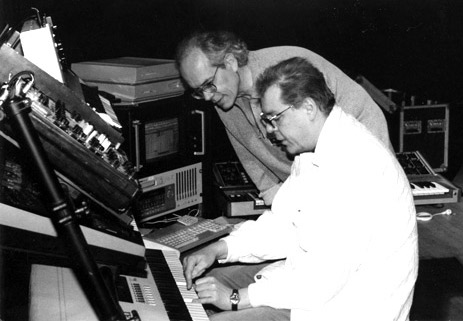
KDM and KS, in Derby, 1996, courtesy of KDM
PSF: How would you describe his compositional method(s)?
KDM: I have no description about Klaus' compositional method(s). He just played, night by night in his studio... and recorded many of it. And releases some of it. Truly: real "composing" was not Klaus' method. It was more trial and error. Playing and selecting.
(Much later and in hindsight, this selecting was also done by me, alone by me, for the idea of the multi CD-Editions).
PSF: How did KS pick collaborators?
KDM: Mostly by accident. And if they liked each other, Only exception that comes to my mind is Go (by Stomu Yamashta, 1976). This was an "official" invitation from a British management. But gladly, Klaus liked Stomu, and his wife, and Michael (Shrieve) and Rosko (Gee).
I never advised him about collaborators. Oh, yes, once I had asked him if he is in the mood to play again for a recording session with drummer Harald Grosskopf because Harald had asked me ...and asked Klaus then. And KS was not interested. I know if he would have met Harald by accident, in a cosy & friendly surrounding, then, yes, maybe. But because of a more or less official request, never.
I just warned him sometimes about some shady figures... or didn't even let them get close to Klaus.
In a interview once in Paris, Klaus was asked about his maybe 'handicap.' Klaus turned to me and asked me: "what is the English expression for the German word Menschenkenntnis"?. I told him and his answer was "Sadly, I have no knowledge about the human nature." Yes, Klaus was very trustful, a positive thinking human.
The 'shady figures' I just mentioned were never musicians but other types... :-)
PSF: Was he especially proud about of any of his albums?
KDM: The question about his most loved album was ALWAYS and ONLY asked by journalists. And his (clever) answer on such a question (he wanted to be friendly) was always: "it's the last album, otherwise I would not have made it." This was not his way of thinking and living and working. He was not a fan and not a journalist. He never thought much about his older albums. Only when he was asked again and again... he must say some words about long forgotten music of his past. Mostly he had even forgotten, in which year this or that album was made, or other trivia...
In this context, he gave sometimes the following example when asked about older albums: "I loved many women. Which one was the best?... which one I am proud of?...what should I answer...? ...should I, can I, answer at all?"
I myself liked Moondawn the most.
PSF: How would you describe KS's aesthetic?
KDM: Klaus was looking for beauty. To show beauty, he also showed us the opposite, sometimes, and all the more the beauty then came to light (especially in concerts).
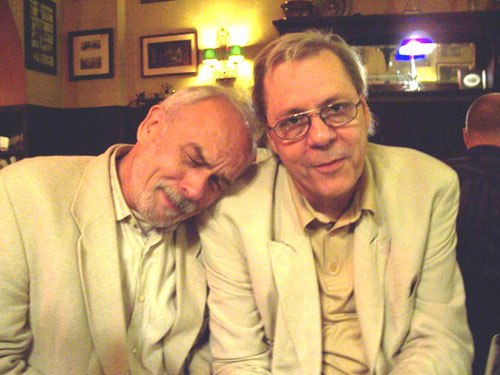
KDM and KS in Berlin, 2008, courtesy of KDM
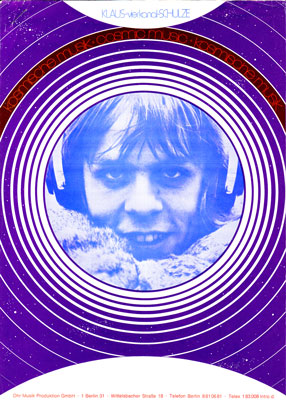
a promo photo from the Ohr label in 1972, from the Tarot record
"In 1971, I began doing a 60-minute prime time program on FM radio once a week featuring music by some of the very early experimental German Rock bands. I called the program EUROCK. Around that same time, I also got turned on to experimental German rock bands thanks to the German 'Beat Club' VJ, music producer Gerhard Augustin. Gerhard worked for United Artists Records in the US from 1970-1974 and sent me albums by Amon Duul 2, Can & Popol Vuh and others.
Gerhard also turned me on to the German label OHR Musik that was releasing music by bands on the new German Experimental Rock scene at that time. He gave me the address of the 'Cosmic Couriers', Rolf Ulrich-Kaiser & his partner Gille Lettmann."- AP
PSF: What was the first KS music that you heard and what was your impression of it?
AP: In 1972, a large package of various LP's arrived via Air Post from OHR Records. The Cosmic Couriers sent me LP's by Tangerine Dream (Electronic Meditation and Alpha Centauri), Irrlicht by Klaus Schulze. subtitled a 'Quadraphonic Symphony for Orchestra and E-Machine', Ash Ra Tempel S/T and Schwingunen, Mythos S/T and various other titles.
Klaus' use of keyboards on Irrlicht creating a 'Cosmic Symphony of Sound' on that album literally blew my mind. To this day, IMO, Klaus' very first album still stands apart from most other 'Electronic or Experimental Space Rock' albums of that time I've heard.
In 1973, Rolf & Gille sent me his second double album Cyborg, which IMO was even more amazing. The albums four sides were each different in terms of deep synthetic rhythmic energy and tempos. The melodic themes and tone colors he conjured up on his keyboard comingled with the undulating energy flow to create a cosmic Wagnerian symphony of sound.
PSF: Do you think there are any particular periods of his music that are his best/strongest or your favorite KS albums?
AP: That's a hard question to answer partly because he released so much music. I do however overall prefer his analog recordings. Digital technology changed Klaus music, as well as most all other music IMO. The sound was much 'brighter', fewer mid range sound frequencies present = more technology and less human input.
If I were to pick my 5 favorite albums it would be the 2 aforementioned titles plus Moondawn, Mirage & X. I'll add one more, his final album Deus Arrakis.
I think all 6 of these albums embody the essential spirit of Klaus Schulze music. When I listen to each of those albums today they all still resonate with me emotionally. Klaus final album Deus Arrakis feels like a warm and wonderful goodbye... In some ways, it's my favorite album because of that...
One thing people may not know is that Klaus never really composed his music. Every day, he would get up and play/record in his home studio. Music was His Life. When it came time for him to release an album, he would pick something he had done during that particular period of time, edit it and shape it into an organic piece of music which reflected the state of mind Klaus he was in at that time.
PSF: Where do you think he fits in the scheme of electronic music and modern German music?
AP: There were so many different new sonic innovations happening during the early 'Deutsch Rock' era it literally changed the culture in Germany. The early albums by Klaus, Kluster/Cluster, Amon Düül II, Can, Tangerine Dream, Ash Ra Tempel, Popol Vuh, Guru Guru and Faust. The music of each of these bands is radically different from the others. I can't think of another country, music or bands like that,
Klaus' music was consistently changing, but was always very identifiable. For every album he made, every fan of his always wanted to buy it. With the incredible number of albums he released, that is perhaps the most amazing thing of all. Klaus fans truly loved his music.
In fact, music from Germany literally impacted the nature of rock music everywhere, and my personal life as well. Post college, I had no idea what I was going to do. I did a EUROCK radio program in 1971, in 1973; I began publishing EUROCK as a 'Fanzine'.
The first 4 issues covered the German Experimental Music Scene. In many ways, Klaus Schulze music and his manager KDM (Klaus D. Mueller) played a big part in helping make all of that all.
PSF: Have you ever met Klaus or corresponded with him?
AP: I've never met Klaus, but we did have a few short email exchanges occasionally. In one email, he gave me his phone number suggesting we talk on the phone.
I have a very good artist/friend who is famous here in Portland and the state of Oregon, his name is Tom Cramer. At one point, he let me use his artwork to make EUROCK hand silkscreened t-shirts. Tom's a BIG fan of Klaus and asked me to send one of those shirts to Tom. When he got it, Klaus told me he loved it.
When we talked one time I told Klaus the story about how way back in 1973 on my radio program after I got the Cyborg LP we played Side 1 & Side 4 of the album on 2 turntables at the same time. Amazingly, the two different spatial electronic melodies were complimentary, even more miraculously, the undulating layers of melodic pulsations in different in tempos were compatible rhythmically. The combination of the two tracks when played together was like a 'Cosmic Electronic Orgasm.'
During and after playing it, we started getting calls at the station asking, "What's that noise coming out of my radio." I told them the artist's and album's name, and many of them said, "It sounds great, keep on playing all the weird music you do every week." The engineer and laughed. When I finished telling that story to Klaus, he laughed as well, and then simply said "They are right."
PSF: What kind of legacy do you think he leaves behind?
AP: Today, there are still artists making music in the vein of Klaus Schulze. People still ask me where they can find music by Klaus and several books have been published about Klaus Schulze and the history of 'Krautrock.'
There's also a German label named Bellerphon Records specializing in the various types of experimental German music being made during that era. Founded in 2009, the label has released 69 albums to date, very much in the musical tradition of the Brain and OHR Record labels.
Bellerphon's latest releases were: Archie The Robot (2021) and Cosmic Pedestrian (2022) by an artist who calls himself Der Petunienmann von Metaluna Vier. Musically, the albums pay homage to the style and sound of Amon Düül II and The Cosmic Couriers.
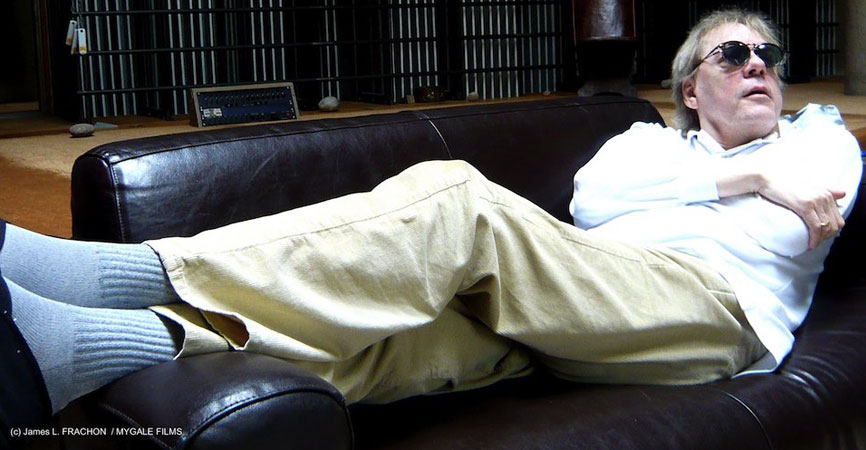
Photo: © James L. Frachon / MYGALE FILMS
PSF: What was the first KS music that you heard and what was your impression of it?
JLF: When I was doing my military service, I decided to rent a horror VHS for the group of soldiers I was in charge over the weekend. The place was packed with guys smoking, watching a tiny square television in the far end of the room. No giant screen back in 1982. The movie started with music that puzzled me immediately, and even though the sound from that shitty TV was bad, I was struck by that music. As I read the opening credit of Next of Kin, I saw "MUSIC BY KLAUS SCHULZE." I loved that sound, the rhythm, the atmosphere, everything.
Back in Paris, I dived into a record store and bought all the LP's I could find on Klaus. That's how he got into my ears, and later into my life.
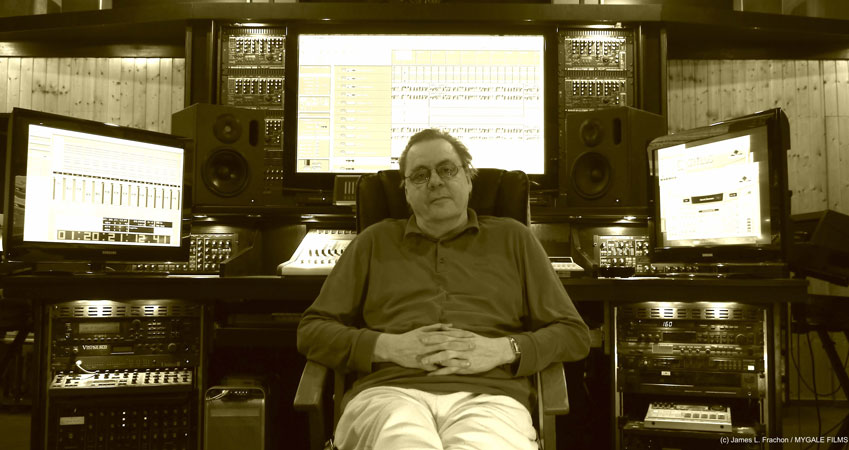
Photo: © James L. Frachon / MYGALE FILMS
PSF: Do you have any particular albums that are favorites? Could you
talk about why?
JLF: Of course I am a big fan of X, Dig It (since it's been used for Next of Kin) as well as Audentity, Time Actor, Angst and Tonwelle.
Obviously Mirage Timewind are unique as well. Body Love and pieces such as "ME TY SHE" from Ballet.
I always loved his collaborations with Pete Namlook in the Dark Side of the Moog collection. La Vie Electronique also has great segments.
People today need to consider that back in the years when Klaus released these albums, it felt like a guy had just landed on planet Earth with his music. Everything sounded new, original. A completely new experience.
His music is like a long walk where you can enjoy a road, dislike another one, get lost, hate it, get bored but suddenly, you arrive in front of an amazing scenery. It's full of surprises.
Klaus always said he never liked to repeat himself and was always trying to move forward with new ideas, even if they could be disliked. He was always trying to change things and create new sounds.
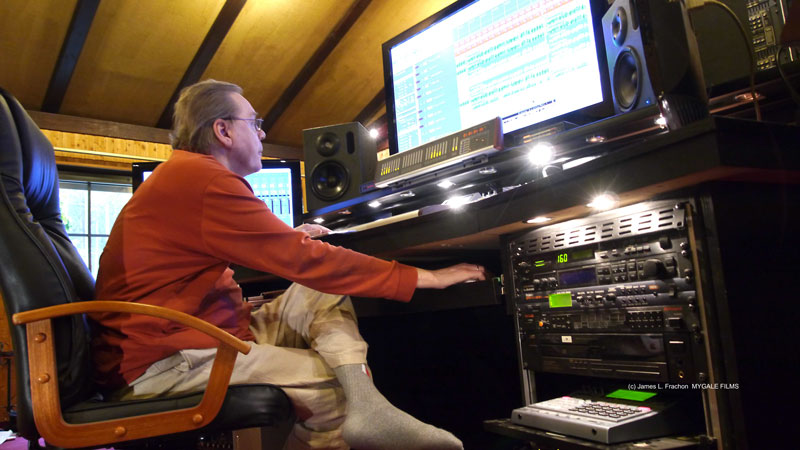
Photo: © James L. Frachon / MYGALE FILMS
PSF: How did you come in contact with KS? What was it like working with him?
JLF: I have directed many documentaries, corporate films, animation, etc. I worked on feature film projects and always wanted to have Klaus involved.
In 2008, I contacted Klaus Mueller and after long friendly exchanges, one day, I got a direct call from Klaus. He was coming to Paris with his manager Michael Schmitz to do interviews for an upcoming tour and album.
We met after his meetings and went straight for diner at La Coupole (a spot Klaus loved back in the '70's) and we spent the whole evening together. From that moment, we never left each other.
A month later, I went to Loreley for his concert with Lisa (Gerrard). My purpose was not to capture the concert with multiple cameras. My goal was just to hang out with the team and capture all the life before, during and after the gigs in order to develop something more exciting than just a concert.
That's how Klaus and I ended up working with just the desire to film The Dark Side of the Moog.
Many years together hanging out with the inner circle has allowed me to capture a lot of things with Klaus, Lisa, Tom Dams and Georg Stettner. Klaus's obsession was only music. He never cared about the filming side of it. Our friendship and complicity has allowed me to collect a lot of footage, for some used in documentaries in DVD's, released by MIG and SPV.
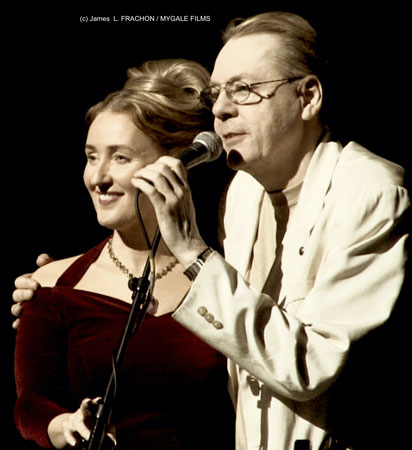
Photo: Lisa Gerrard and KS © James L. Frachon / MYGALE FILMS
PSF: How did you conceptualize the films you did of his music? Did you
consult with him beforehand?
JLF: Klaus trusted me and we never discussed filming issues. He let me do anything I wanted and never felt more relaxed. We were just happy to hang out together. The same with Lisa, who did an amazing work touring with Klaus.
One day in Essen, she had to perform alone because Klaus was too sick to go on stage. Michael had told the audience he couldn't play and whoever wanted to leave would get a refund. Nobody left. Lisa walked on stage alone, while Tom Dams was controlling the machines... It almost felt like Klaus had passed away and we shared a private magical moment.
So basically no, we never consulted beforehand. Klaus trusted me.
In 2013, with the support of Canal+ (a French network), I came up with a short animation film featuring Klaus. I imagined an action figure that looked like Klaus back in the old days when he had fame and long hair. That plastic toy was sold with tiny fake Moogs and was awarded "Best Toy 1979."
My short film takes place now, in the present time, when a TV network decides to air LIVE, a concert performed by Klaus Schulze to commemorate 40 years as the "Electronic Legend" many consider he is.
In the attic of a house, among abandoned toys, the action figure, representing Klaus in the old days, decides to create a stage with the tiny cardboard Moogs right in front of a TV set and starts playing in synchronicity with the real Klaus Live on TV.
That short film was my sort of tribute to Klaus, and of course I drove to his place to film the ending of the film with him.
Tom Dams and Georg Stettner helped me in the studio while Elfi (Klaus's wife) was giving us drinks and food. It felt like family business, having fun creating this.
Tom Dams and I are currently working on projects such as releasing that short film with a lot of unseen footage and more to come...
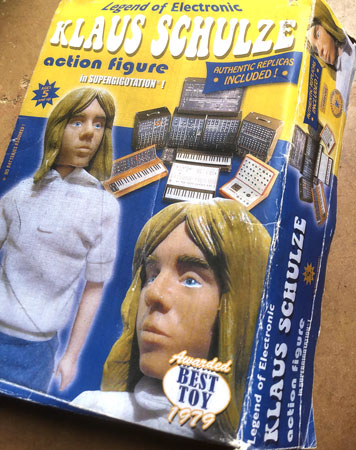
Photo: © James L. Frachon / MYGALE FILMS
PSF: What kind of legacy do you think KS leaves behind?
JLF: He is the example of a man whose obsession was to experience, perform whatever he wanted, discover new frontiers, new sounds, new tunes without caring about the charts, fame, and money.
He did what he wanted whether you liked it or not. He composed pieces that were impossible to play on the radio due to their length, and never cared about the marketing issues.
Klaus leaves behind an outstanding body of work as one of the pioneer devoted to his passion for electronic music.
Sleeping daytime and composing at night, Klaus was a charming electronic vampire I have loved hanging out with.
See his YouTube page and his Facebook page.
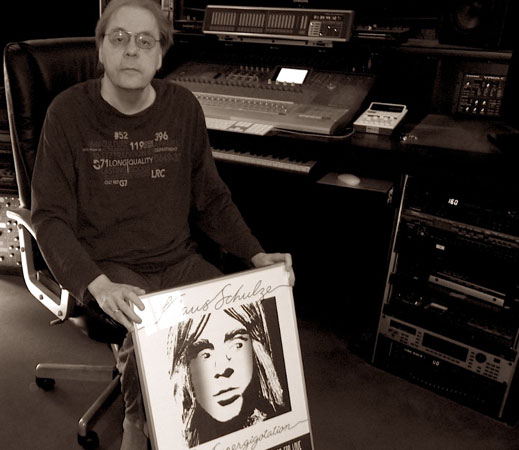
Photo: © James L. Frachon / MYGALE FILMS